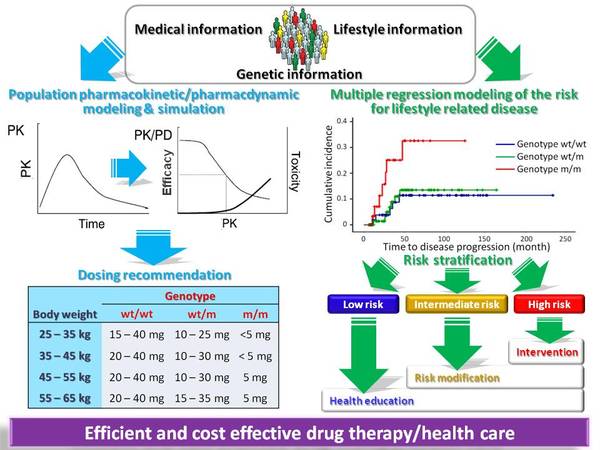
薬物治療学分野の研究
図: 薬物の個別化投与設計と副作用・生活習慣病リスクの層別化に関する当研究室の取り組み
Figure: Our approach to develop an optimized dosage at each patient and a personalized health plan based on the risk stratification
【研究概要】
私共の研究は、個別化医療の推進を目的として、薬物代謝酵素等の遺伝子多型や他の個体要因(性別、喫煙歴、飲酒歴、併用薬等)と、薬物動態や薬力学、疾患感受性、病態との関係を明らかにすることで、患者背景に基づく、個々に適した薬物投与量の設定と、副作用発現並びに生活習慣病のリスク層別化を行うことに集約されます。
具体的には、1.モデリング&シミュレーションの手法を用いて、精神神経疾患治療薬の個別化投与設計法の開発を行っています。中でも、クロバザムやバルプロ酸といったいくつかの抗てんかん薬では、薬物代謝酵素 cytochrome P450等の遺伝子型を組み込んだ母集団薬物動態―薬力学モデルを構築し、遺伝子型を含む患者情報に応じた推奨投与量の提案を行っています。 また、2.生活習慣病予防のための有用性の高い遺伝情報を、①疾患の発症や進展を有意に修飾する科学的根拠があり、②発症早期から 病態に関与して早期予防に役立ち、③変異アレル頻度が高く、④生活習慣(喫煙など)と相互作用を示す、という4条件を重視して検討しています。これまでに 糖尿病・高血圧・脂肪肝等の発症リスクを層別化するための複数の候補遺伝子を見出し、生活習慣病の発症と進展予防のための生活改善に役立つ遺伝子診断パネル作成を目標に研究を進めています。他にも、3.薬の副作用発現の性差については様々な報告があるものの、その詳細は不明であることから、我々は、熊本県薬剤師会Drug Event Monitoring (DEM)事業データの提供を受けて、DPP-4阻害薬等の各種薬剤使用中に起きた副作用における性差の検討を行っています。また、4.生薬・漢方薬の薬物相互作用に関する安全性試験や、5.新しいフリーラジカル測定法の開発と応用を目指した検討も行っています。
さらに詳しい研究内容はこちらをご覧ください。
Our research projects can be summarized as follows: to develop an optimized dosage of clinically important drugs and a personalized health plan by using the genetic factors, particularly genetic determined drug-metabolizing enzymes, in combination with the other patient's factors (gender, age, smoking habits, alcohol consumption, co-administered drugs, etc.). Concretely, 1) we attempt to identify the determinants of pharmacokinetics and pharmacodynamics of the neuro-psychotropic drugs using a modeling & simulation approach. To date, we developed the population pharmacokinetic/pharmacodynamic models of several commonly used antiepileptic drugs, such as clobazam and valproic acid, incorporating genetic polymorphisms of cytochrome P450 enzymes, and then we proposed the recommended doses based on the patient genotype, body weight, co-administered drugs, etc. 2) Opportunities exist at every stage of disease initiation and progression for the develop ment of a health plan addressing lifestyle, risk modification, and disease management. We therefore attempt to identify the common susceptibility genes, which modify the disease initiation and progression in concert with the lifestyle, using multiple regression models, and to develop a personalized health plan based on the risk stratification by the combination of several susceptibility genotypes. Additionally, 3) we attempt to detect the risk factors, particularly female sex, on the patient-reported symptomatic adverse drug reactions based on the Japan Pharmaceutical Association initiated a Drug Event Monitoring (DEM) project. Other projects include 4) Safety assessment: evaluation of the potential interaction between Kampo medicine and co-administered drugs; and 5) Development of novel biomarkers for oxidative stress: A collaborative project with Kyushu University of Health and Welfare, and the Dojindo Molecular Technologies, Inc.



















